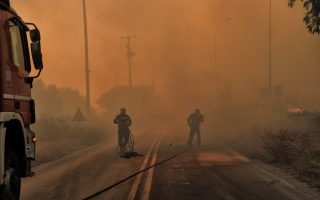Absence of emergency plan behind the death toll

Greek fire service officers and retired firefighters point to an unprepared state mechanism and the absence of an emergency plan as the main culprits behind the tragedy in eastern Attica, dismissing suggestions by government officials of a deliberate arson plan aimed at destabilizing the country.
They describe the blaze that started on Monday in the area of Daou on the eastern slopes of Mount Pendeli as a “mega-fire,” due to the fact that it erupted in a forest of particularly flammable pine trees as strong winds blew in the area. The combination of these two factors meant that the blaze spread out of control very fast, reaching the coast within just a couple of hours.
Furthermore, firefighters and water-dropping aircraft were busy trying to control a separate fire in Kineta, western Attica, meaning that there was some delay in the response to the east Attica blaze.
Nevertheless, experienced firefighters say that the absence of an emergency plan lies behind the deaths of at least 74 people who were trapped by the flames as they fled their homes and sought a safe way out of the area. They blame the Fire Service, the Attica Regional Authority and the General Secretariat for Civil Protection in particular, which is responsible for coordinating all the relevant agencies.
They also point to the state’s apparent lack of preparedness despite warnings issued over the weekend that the fire risk on Monday would be at Level 4, the highest, throughout the region of Attica.
“It is obvious that there were delays in the response to the Daou fire. The force had been dispatched to Kineta and authorities did not expect a second fire to break out in Attica,” one seasoned firefighter told Kathimerini.
Responding to rumors and speculation that Monday’s fires were the result of an organized arson plot, the same sources note that it is not unusual during the fire season for there to be as many as 10 conflagrations in the Attica area. They also point to witness testimony that the Kineta blaze was started by sparks seen coming from power pylons.
The events in eastern Attica, meanwhile, have stirred memories of the deadly 2007 fires in Ilia in the Peloponnese, with fire officials saying that there are similarities between the two incidents. In both cases, strong winds and dense brush on the ground hampered efforts to contain the fires, but they add that heavy rainfall earlier this month and in June in Attica meant that conditions on the ground were not as dry as they were in the Peloponnese in 2007.




